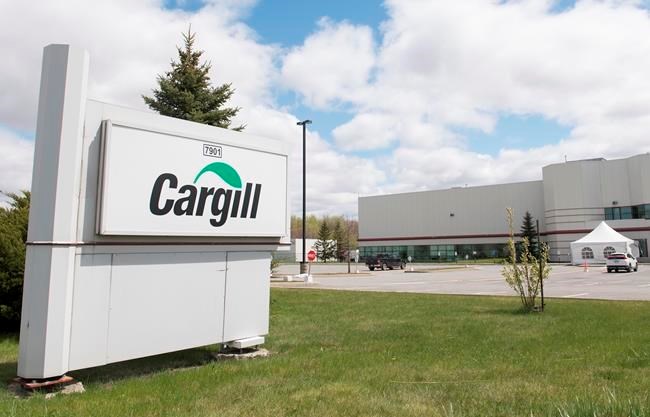MONTREAL — A Cargill meat-processing plant south of Montreal announced it is closing its doors after at least 64 workers tested positive for COVID-19, even as schools across much of Quebec prepared to open theirs to students on Monday.
The outbreak in Chambly, Que. marks the second time the company has experienced a COVID-19 closure at one of its facilities in Canada.
A spokeswoman for the union representing the workers said the Cargill plant will close temporarily as of Wednesday so all its workers can be tested.
Roxane Larouche said 171 workers were sent home last week as a preventative measure, and 30 of them have tested negative. The testing is expected to last until Friday, and the plant will reopen once there are enough uninfected employees to run it safely.
Cargill said the 64 workers represent 13 per cent of the workforce at the plant. The company said three employees have recovered.
"Because the health and safety of Cargill employees remains our priority, we've decided to close our protein production factory in Chambly," the company said, adding that it would continue to pay workers during the stoppage.
"Cargill is working in close collaboration with local health authorities and the union to test our employees as quickly as possible."
The workplace had implemented safety measures for employees, including installing plexiglass between workers where possible, staggering arrival and departure times and providing masks, visors and safety glasses, Larouche confirmed.
A Cargill beef-packing plant in High River, Alta., reopened last Monday after a two-week shutdown.
More than 900 of 2,000 workers at that plant have tested positive for the novel coronavirus.
In a statement, Agriculture and Agri-Food Canada said public health authorities and food inspectors were working with plant owners to ensure the safety of both workers and the food supply.
It noted the federal government had committed $77.5 million in funding to help processors carry out safety retrofits and purchase protective equipment, as well as $20 million for food safety inspectors.
"We fully recognize the health concerns of workers in certain meat plants," the statement read.
"As with all essential workers, proper measures must be in place, if workers can continue to provide essential services to Canadians during these critical times."
Meanwhile, some of Quebec's children are preparing to return to class on Monday as the province moves ahead with a plan to reopen elementary schools and daycares outside the Montreal area.
Students will be subject to physical distancing, frequent handwashing and carefully co-ordinated school days spent in large part at their desks while school officials keep up with cleaning, disinfection and following public health guidelines.
Attendance isn't mandatory, and two school boards told The Canadian Press that most of their students were staying home for now.
The province allowed most retail stores outside Montreal to open May 11, but pushed back the opening date for schools and other businesses in the hard-hit metropolis to May 25 as case numbers remained high.
As of Sunday morning, there were 67,996 COVID-19 cases, including 4,728 deaths, according to Canada's top public health doctor, Dr. Theresa Tam. Some 47 per cent of cases have recovered, she said in a statement.
Over half of the country's cases are in Quebec, which registered 142 new deaths on Sunday for a total of 2,928, as well as a caseload of over 37,700.
Other provinces are also taking small steps to reopen, albeit at a slower pace than the hardest-hit province.
Ontario allowed hardware stores and safety supply stores to reopen this weekend, while non-essential retail stores will be allowed to offer curbside pickup this week.
The province reported 35 more deaths related to the novel coronavirus and 294 more cases, which represents the lowest rate of growth since March, even as the province was dealing with another COVID-19 outbreak at Toronto Western Hospital.
The University Health Network said the new outbreak is on the hospital's 9A Fell unit, which had previously been declared one of its "COVID negative units."
The organization didn't reveal how many cases are part of the new outbreak, but said that across its network, 83 staff members have tested positive for the virus from January to May 4.
Alberta is also planning to allow some retail stores to open this week, while New Brunswick's stores, offices, restaurants, libraries, museums and campgrounds started reopening Friday — but only if they could show they had a plan to meet guidelines for physical distancing, hand hygiene and allowing staff to remain home when ill.
Saskatchewan and Manitoba began to gradually reopen last week, while British Columbia is phasing in the reopening of its economy with certain health services, retail outlets, restaurants, salons and museums resuming some operations in mid-May.
In Prince Edward Island, there was some good news as the province's chief health officer announced Friday that some physical distancing restrictions would be lifted, including an allowance for Mother's Day hugs.
This report by The Canadian Press was first published May 10, 2020.
-- With files from Helen Moka in Montreal
Morgan Lowrie, The Canadian Press




